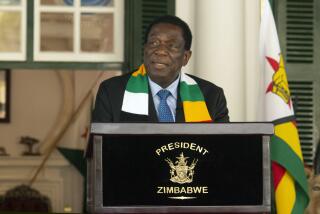2 Groups of Observers Label Cambodian Voting Free and Fair
- Share via
HANOI — Two international observer groups Tuesday generally endorsed Cambodia’s national election as free and fair, opening the door for the country’s re-integration into the world community.
A U.N.-coordinated group of 500 observers from 20 nations said it believed that Sunday’s vote had been sufficiently free to reflect the will of the people, and it called on all parties to accept the results.
And 60 U.S. observers called the parliamentary election a step toward democracy. “My hat is off not only to the voters but to the former political leaders in exile for returning to contest the election,” said James R. Lilley, the former ambassador to China and co-leader of the U.S. delegation.
Both observer groups noted that there had been widespread intimidation, scattered violence and electoral irregularities in the weeks leading up to the vote. But pending final tabulation of results, they said the election and the early phase of the vote counting seemed to have come off remarkably smoothly.
Unlike the 1993 election, which was organized and overseen by the United Nations, this election was handled entirely by Cambodia. The 1993 election was negated in 1997 when Hun Sen overthrew his co-premier, Prince Norodom Ranariddh, in a bloody coup.
The violence led to Cambodia’s pending membership in the Assn. of Southeast Asian Nations, or ASEAN, being put on hold and its U.N. seat being declared vacant. Most countries cut off all but humanitarian aid, and the tourist industry virtually died.
Without an endorsement from foreign monitors that the latest election was fair, Cambodia was unlikely to regain its seats in international bodies or see a resumption of much-needed foreign aid.
At this week’s ASEAN meeting in Manila, a senior U.S. official said that while the counting process “appeared to be transparent and fair and honest, without significant problems,” some concerns about the number of people counting votes were reported.
And Secretary of State Madeleine Albright struck a cautious note.
“The only thing we know for a fact is that the Cambodian people voted in large numbers, as they did in the previous election. They clearly are devoted to being able to vote and state their views,” she said.
In any case, the country’s political rivalries do not appear to have ended. Hun Sen, the heavy-handed leader of the ruling Cambodian People’s Party, or CPP, claimed an overwhelming victory Tuesday, although only a fraction of the votes from 11,500 polling places had been counted.
His opponents immediately called the vote fraudulent and said they will boycott the National Assembly.
Ranariddh demanded that another election be held in areas where he cited irregularities. The other key opposition leader, Sam Rainsy, promised to organize “all kinds of protests.”
Former Rep. Stephen J. Solarz (D-N.Y.), co-leader of the U.S. delegation, said Ranariddh and Rainsy will need to produce hard evidence if their claims are to be believed by the international community.
“At the moment,” Solarz said, “we are not convinced that the concerns they have expressed justify the conclusions they have reached. . . . But if it turns out that the investigation establishes that these allegations are based on legitimate concerns . . . we will join with them in calling for corrective action.”
Ranariddh’s party--called the United National Front for an Independent, Neutral, Peaceful and Cooperative Cambodia, or FUNCINPEC--handily defeated Hun Sen’s CPP in the 1993 election, but Hun Sen muscled his way into a power-sharing arrangement with the prince by threatening to start a civil war.
After Sunday’s vote, with the National Assembly’s 122 seats at stake, CPP spokesman Pra Sokhonn said his party would win 65 to 67 seats, with FUNCINPEC getting 42 to 45 and Rainsy 13.
The endorsement by the international monitors was a major boost for Hun Sen, a former Khmer Rouge commander. He had promised to step aside if defeated, but many foreign diplomats believed that he had no intention of surrendering power, regardless of the outcome of the vote. His party controls the military, the media and the key governmental organizations.
Times staff writer Robin Wright in Manila contributed to this report.
More to Read
Sign up for Essential California
The most important California stories and recommendations in your inbox every morning.
You may occasionally receive promotional content from the Los Angeles Times.













